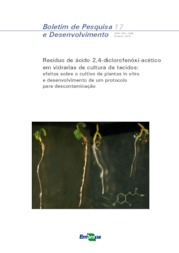Residues of 2,4-Dichlorophenoxyacetic acid in plant-tissue culture glassware: their effects and a decontamination protocol.
Residues of 2,4-Dichlorophenoxyacetic acid in plant-tissue culture glassware: their effects and a decontamination protocol.
Author(s): DAL BOSCO, D.; SINSKI, I.; RITSCHEL, P. S.; QUECINI, V.
Summary: Plant development and gene transfer studies frequently require the induction of quiescent somatic cells to recuperate embryogenic potential via application of synthetic auxin analogs. The severe effects of hormone analogs on plant growth and development have prompted their use as herbicides in agriculture, where they were demonstrated to be deleterious contaminants to soil and water, also associated to increased frequencies of certain human tumors. In order to investigate the effects of 2,4-dichlorophenoxyacetic acid (2,4-D) contamination in plant tissue-culture laboratories, the development of three plant species was investigated on glassware free of hormone residues and plates containing synthetic auxin residue. Residual 2,4-D severely impaired seed germination, seedling establishment and aerial and root development of the tested plant species, namely; Arabidopsis thaliana, Petunia x hybrida and Solanum lycopersicum. A simple and feasible decontamination protocol for laboratory plastic and glassware was developed, based on international recommendations for handling chlorophenoxy herbicide residues. The effectiveness of the decontamination procedure was assayed by in vivo analyses of plant growth and development on hormone-free media contained in contaminated, decontaminated and new glassware. Plant development parameters evaluated on decontaminated glassware were indistinguishable from those observed in plants grown on new plates, indicating that hormone contamination was significantly reduced to levels unable to affect the plants for the three species investigated.
Publication year: 2010
Types of publication: Journal article
Unit: Embrapa Grape & Wine
Observation
Some of Embrapa's publications are published as ePub files. To read them, use or download one of the following free software options to your computer or mobile device. Android: Google Play Books; IOS: iBooks; Windows and Linux: Calibre.
Access other publications
Access the Agricultural Research Database (BDPA) to consult Embrapa's full library collection and records.
Visit Embrapa Bookstore to purchase books and other publications sold by Embrapa.

